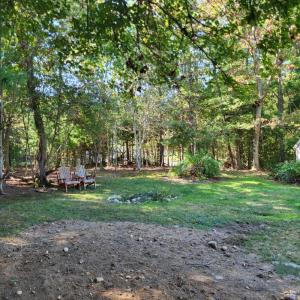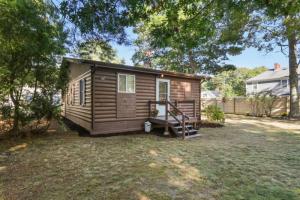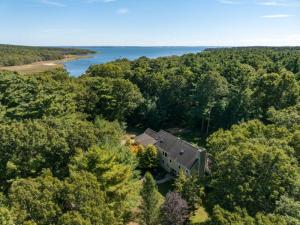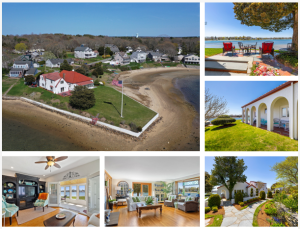Transatlantic voyage recounted at Stone Path Malt
 Dr. Philip Haydon speaks in front of a map of his 4,000-mile voyage from Florida to Portugal. The Tufts University neuroscience professor spoke about his trip at Stone Path Malt on Sunday, Nov. 6. Photos by: Wes Cipolla
Dr. Philip Haydon speaks in front of a map of his 4,000-mile voyage from Florida to Portugal. The Tufts University neuroscience professor spoke about his trip at Stone Path Malt on Sunday, Nov. 6. Photos by: Wes Cipolla Members of the Catalina Association of New England listen to Dr. Philip Haydon share stories from his recent transatlantic voyage.
Members of the Catalina Association of New England listen to Dr. Philip Haydon share stories from his recent transatlantic voyage.  Everyday life on his boat was a series of repetitive tasks to make sure everything was running properly.
Everyday life on his boat was a series of repetitive tasks to make sure everything was running properly.  Portugal was Haydon’s final destination.
Portugal was Haydon’s final destination.  Haydon’s journey took him through solitary and stormy seas.
Haydon’s journey took him through solitary and stormy seas.  Through his nonprofit, Sail for Epilepsy, Haydon has met people with epilepsy from around the world. They inspired his voyage.
Through his nonprofit, Sail for Epilepsy, Haydon has met people with epilepsy from around the world. They inspired his voyage.  Dr. Philip Haydon speaks in front of a map of his 4,000-mile voyage from Florida to Portugal. The Tufts University neuroscience professor spoke about his trip at Stone Path Malt on Sunday, Nov. 6. Photos by: Wes Cipolla
Dr. Philip Haydon speaks in front of a map of his 4,000-mile voyage from Florida to Portugal. The Tufts University neuroscience professor spoke about his trip at Stone Path Malt on Sunday, Nov. 6. Photos by: Wes Cipolla Members of the Catalina Association of New England listen to Dr. Philip Haydon share stories from his recent transatlantic voyage.
Members of the Catalina Association of New England listen to Dr. Philip Haydon share stories from his recent transatlantic voyage.  Everyday life on his boat was a series of repetitive tasks to make sure everything was running properly.
Everyday life on his boat was a series of repetitive tasks to make sure everything was running properly.  Portugal was Haydon’s final destination.
Portugal was Haydon’s final destination.  Haydon’s journey took him through solitary and stormy seas.
Haydon’s journey took him through solitary and stormy seas.  Through his nonprofit, Sail for Epilepsy, Haydon has met people with epilepsy from around the world. They inspired his voyage.
Through his nonprofit, Sail for Epilepsy, Haydon has met people with epilepsy from around the world. They inspired his voyage. Although there was no alcohol on his boat, Dr. Phil Haydon wondered what he was drinking when he first saw the green flash.
It was during his 4,436-mile voyage across the Atlantic Ocean, which began in Fort Lauderdale, Fla. on May 15 and ended in Portugal on June 25 of this year. The Tufts University neuroscience professor and avid sailor was taking in the sunset on the deck of the Ingwe, his 50-foot-long catamaran.
As the sun sank below the waves, a green flash of light appeared on the horizon for a split second. That single moment is a natural wonder that some of Haydon’s fellow sailors have spent their entire lives searching for.
“We had amazing views,” he said. “We lost count of how many dolphins we saw. We saw great sunsets.”
Haydon regaled members of the Catalina Association of New England with tales of his voyage at Stone Path Malt on Sunday, Nov. 6. He shared the Malt with a child’s birthday party, and occasionally had to fend off balloon-wielding tykes who wandered into his space. Wareham’s central location makes it the perfect meeting place for the association.
“It’s a lovely place,” Haydon said.
Haydon sailed across the Atlantic for his nonprofit, Sail for Epilepsy. When Haydon was a 15-year-old kayaker living in England, a drunk teenager hit him in the head with a brick. The injury caused him to lose two inches of his skull and be diagnosed with post-traumatic epilepsy. Haydon found sailing to be a safer hobby that still allowed him to be near water, his lifelong love.
“It’s the challenge of doing something to live a fuller life,” he said. “Don’t let epilepsy stop you from living a life.”
Haydon set sail with four of his friends. Throughout the voyage, he communicated with his “virtual shipmates,” people with epilepsy he met through his nonprofit. Their names were written on the sides of his ship. One of his favorite things to teach children with epilepsy is how to use the stars for navigation.
“Every night, I looked at the North Star and I thought of the kids I’ve spoken to,” he said. “Seeing the stars at night, you’re totally isolated and there’s no other living soul around you. There was no light pollution.”
When Haydon and his crew were in the middle of the ocean, the closest humans were the ones on the International Space Station, over 200 miles above Earth.
“I quite like the solitude,” Haydon said. “So much of our life nowadays is that we’re so connected with everything, but when I’m on the ocean, I’m on my own or with a couple of people. It’s so different.”
Organization and planning were a challenge, especially for medical emergencies. When faced with tasks at sea, he did it in what he likes to call “the English way;” while drinking a cup of tea. He had to explain to his crew that they would be sailing anywhere between 12 and 18 hours each day.
“I never saw eyes that big,” he said.
It wasn’t as tough as it sounded. Haydon, a neurologist who studies sleep, never stayed up for more than six hours at a time. He and his crew took naps throughout the day to stay energized, and he encouraged his audience at Stone Path Malt to do the same.
He said that some sailors, who he declined to name, are “very macho” about their ability to go without sleep, only to meet disaster on the rocks. On previous trips, Haydon suffered the effects of sleep deprivation firsthand. He has hallucinated phantom boats on the water, and even had a conversation with a nonexistent captain. He once imagined himself conversing in fluent German with two of his crewmates. He only speaks three words of German.
“I find I can sleep very easily on a boat,” he said. “When the waves get significant, it can be difficult, but generally I find it quite easy.”
There were times when the waves did get significant. In Haydon’s words, they “kicked [him] in the pants.” Just looking at his videos of the storm-tossed Ingwe bouncing through the water was enough to make one seasick.
“You see the storm is coming,” he said, “and then there’s this anxiety. But then the storm arrives, and you just deal with it, and then there’s this sense of elation. I’m in a storm, everything is fine, and we’re gonna make our way through it. The anticipation is the worst part.”
When he finally made it to Portugal, he attended events which raised awareness of epilepsy and taught first aid in case of seizures. He visited small coastal villages and shared meals of fresh-caught fish with local families.
“Portugal is a fascinating country,” he said. “A beautiful country.”
The Ingwe came out of the journey with a torn sail.
“That was okay,” he said. “We made it.”







































